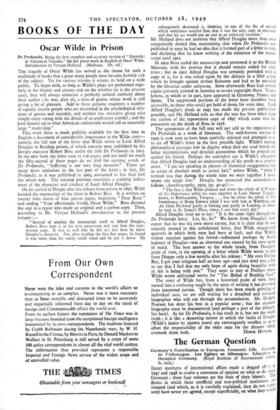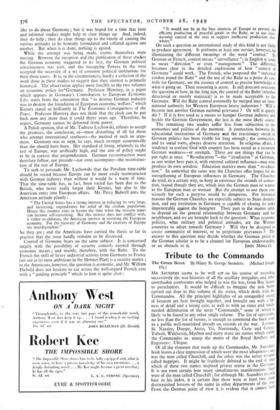The German Question Germany's Contribution to European Economic Life. Controle
de l'Allemagne. Lea Eglises en Allemagne. Education in Occupied Germany. (Royal Institute of International Affairs. 5s. each.) EIGHT institutes of international affairs made a dogged effort in 1947 and 1948 to evolve a consensus of opinion on what to do about Germany ; these four volumes are the fruit of their labours. The States in which these unofficial and non-political institutions are situated (and which, as it is carefully explained, they do not repre- sent) have never yet agreed, except superficially, on what they woulu
like to do about Germany ; but it was hoped for a time that joint and informal studies might help to clear things up. And, indeed, they do help ; they do clear things up to the extent of causing the various attitudes to be honestly formulated and collated against one another. But when it is done, nothing is agreed.
While the attempt was being made, events themselves were moving. Between the inception and the publication of these studies the German economy staggered to its feet, the German political consciousness was astir, and the occupying Powers in the west accepted the necessity of a set of common political institutions for their three zones. It is, in the circumstances, hardly a criticism of the work done in these studies to suggest that their interest is primarily historical. The observation applies most forcibly to the two volumes on economic policy for•Germany. Professor Hawtrey, in a paper which appears in Germany's Contribution to European Economic Life, starts from the contention that " to destroy German industry was to destroy the foundation of European economic welfare," which Keynes stated so brilliantly in The Economic Consequences of the Peace. Professor Hawtrey does not think that the clock can be put back now any more than it could thirty years ago. Therefore, he argues, Germany cannot be debarred from power.
A Polish opinion, that of Mr. Tadeusz Lychowski, refuses to accept the premises, the conclusion, or—most disturbing of all for those who attempt international syntheses—the method of such an argu- ment. Germany was in 1939, he says, much stronger economically than she should have been. Her standard of living, relatively to the rest of Europe, was artificially high, and the aim of policy ought to be to correct this preponderance. German reconstruction must therefore follow, not precede—nor even accompany—th reconstruc- tion of the rest of Europe. To seek to persuade Mr. Lychowski that the Potsdam time-table should be varied because Europe can be more easily reconstructed with German industry than without it would be a waste of time. That the time-table has, in fact, been varied has been due to the British, who never really forgot their Keynes, but also to the American entry into European affairs. Mr. Percy Bidwell puts the American attitude plainly :
"The United States has a strong interest in reducing its very large, and increasing, expenditures for relief of the civilian population. Hence this country aims to hasten the time when the western zones can become self-sustaining. But this interest does not conflict with, it rather re-enforces, the American interest in restoring the European economy. For the recovery of Germany and the recovery of Europe are interdependent."
So they are ; and the Americans have carried the thesis so far in practice that the issue hardly remains to be discussed.
Control of Germany bears on the same subject. It is concerned largely with the possibility of security controls exerted through economic means ; and mainly, therefore, with the Ruhr. To the French the shift of heavy industrial activity from Germany to France (set out at its most ambitious in the Monnet Plan) is a security matter ; to the Americans, however, the question is economic, and Mr. William Diebold does not hesitate to cut across the well-argued French case with a " guiding principle " which to him is quite clear: " It would not be in the best interests of Europe to prevent the efficient production of peaceful goods in the Ruhr, or to use inter- national control of the area to support inefficient production else- where."
On such a question an international study of this kind is not likely to produce agreement. It performs at least one service, however, by illuminating the different meanings of the word " control." In German or French, control means " surveillance "; in English it tends to mean "direction " or even "management." The difference becomes clear in the detailed exploration of how "control of Germany " could work. The French, who proposed the " statistical cordon round the Ruhr " and the use of the Ruhr as a poste de con- trole for Germany, see the essence of control as precise knowledge of what is going on. Their reasoning is acute. It still does not overcome the question of how, in the long run, the control of the Ruhr (whether directorial or merely statistical) is to be made acceptable to the Germans. Will the Ruhr control eventually be merged into an inter- national authority for Western European heavy industries ? Will it become just another German national grievance ? Or will it quietly die ? If it is first used as a means to hamper German industry and heckle the German Government, the last is the most likely course.
The remaining two studies suffer less from subjection to the economics and politics of the moment. A connection between the educational institutions of Germany and the reactionary streak in German politics has been visible for long enough ; the connection, and its social roots, always deserve attention. In religious affairs, 3 tendency to confuse God with country has been noted as a recurrent German weakness—or strength. These arc not things that can be put right at once. " Re-education "—the " irradiation " of Germany, as one writer here puts it, with external cultural influence—may even produce its own antidote. Education matters more than " re-educa- tion." In somewhat the same way the Churches offer hopes for the strengthening of European influences in Germany. The Churches do tend, in a certain way, to keep in existence the strands of connec- tion, frayed though they are, which join the German man or woman to the European man or woman But the attempt to use them con- sciously for such a purpose would be dangerous. For historical reasons the German Churches are especially subject to State domina- tion, and any institution in Germany is capable of closing its ranks impenetrably against the foreigner. Their part in the matter tend, to depend on the general relationship between Germany and her neighbours, and we are brought back to the question : What economi: policies, what military and political attitudes, are the Western countries to adopt towards Germany ? Will they be designed to create community of interest, or to perpetuate grievances ? The answer to this question may decide whether the German priest or the German scholar is to be a channel for European understanding







































 Previous page
Previous page